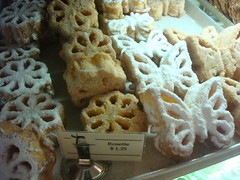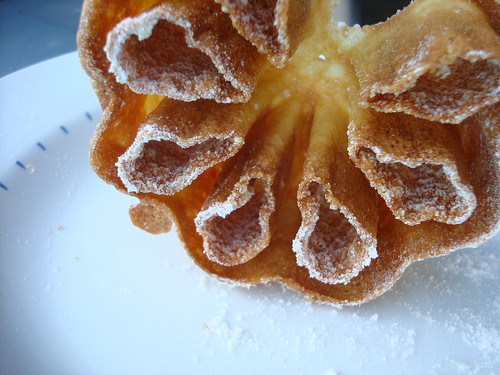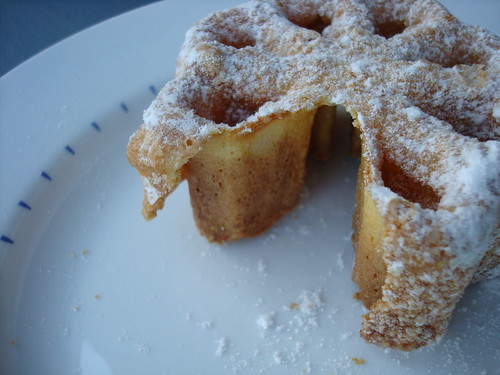
Last week while trolling the Seattle suburbs for baked goods, we came across one that completely caught our fancy at the Hillcrest Bakery in Bothell: the rosette. Displayed in sweet little rows in two shapes (rosettes and butterflies), these cakes were available plain or garnished simply and prettily with powdered sugar.


Dainty yet substantial would be the perfect way to describe these treats, which are actually hollow (see below); while they are light and delicate, they do get a substantive and delicious boost from deep-frying, which gives them a flavor something like funnel cake, but with a tantalizingly crunchy texture.
So what's their story? Well, according to Epicurious.com's food dictionary, the rosette is:
A small fried pastry made by dipping a rosette iron first into a thin, sweet batter, then into hot deep fat. When the mixture turns crisp and golden brown, the rosette is removed from the iron and drained on paper towels. While warm, these pastries are usually sprinkled with cinnamon-sugar. A nonsweetened batter may be used to make savory rosettes, which can be sprinkled with salt and served as an appetizer. A rosette iron has a long metal rod with a heatproof handle at one end and various decorative shapes (such as a butterfly, heart, star or flower) that can be attached to the other end.
They are also cousin (that is to say, there are attachments that can be added to the same handle to make them--see left) to a sort of open-ended pastry family called timbale, which Epicurious.com tells us is
a pastry shell made by dipping a timbale iron first into a batter, then into deep, hot fat. When the crisp pastry is pushed off the iron and cooled, it can be filled with a sweet or savory mixture.
The rosette cookies, it seems, are typically served in Sweden as a Christmas cookie; however, as discovered on a Rosette wikipedia blurb, in Finland they "may be served at May Day (Vappu) celebrations as an alternative to funnel cakes (tippaleipä)." Clearly they've got the right idea--these little treats are definitely too good to hide away most of the year.


If you're not near a Swedish bakery (poor thing!) don't despair quite yet--you can make your own at home. The only catch is that they do require specific equipment--those signature delicate shapes are, after all, the result of special molds; however, they're not outrageously priced (here's one set for $23!). However, beyond that they don't seem too difficult to make; according to Diana's Desserts, which also has recipes, "The trick to making good rosettes is to preheat the iron in the oil, and to be sure not to dip the iron so deeply into the batter that it coats the top of the iron."
Of course, if all that seems too hard, you could always hop the next plane to Sweden. We hear airfare's good right now.

